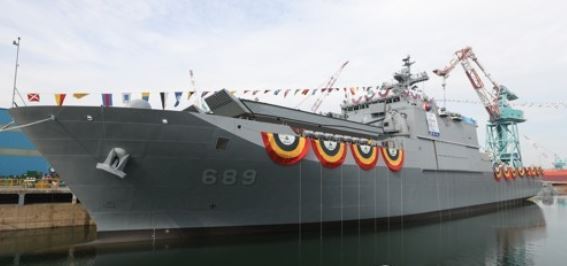South Korea launched and christened its newest Navy landing ship Thursday, the state arms procurement agency said.
It is the fourth vessel built in the LST-II program designed to replace the smaller amphibious landing ships currently in operation. The 2,600-ton Go Jun Bong-class, or LST-I, landing ship has a single helipad that is used just for take-off and landing. The 4,900-ton Cheon Wang Bong-class ship, on the other hand, has two helipads and can accommodate choppers, mechanized landing craft, amphibious assault vehicles and more than 300 troops.
The new ship is named No Jeok Bong after one of the peaks of Yudal Mountain in Mokpo, South Jeolla Province.

"Once the No Jeok Bong is put in combat operation, it will further strengthen our military's assault and defense capabilities by enabling large-scale combined landing operations of the Army, the Navy and the Air Force," Jeon Jei-guk, head of the Defense Acquisition Program Administration, said in a launch ceremony held at the shipyard of Hyundai Heavy Industries in Ulsan.
The No Jeok Bong, 127 meters long, can carry more than 120 crew and sail at a maximum speed of 23 knots, or 40 kilometers per hour.
It's equipped with a domestically-developed combat system and a landing operation command center, according to DAPA.
"It will be tasked with transporting troops, equipment and other materials to military bases and islands. In the event of a conflict, it will be mobilized for transporting expeditious response forces," said the agency.
If necessary, it added, the ship will support international cooperation activities, including peacekeeping operations, and also carry out non-military and humanitarian missions such as disaster relief.
It will be delivered to the Navy in November next year and commissioned in 2019. (Yonhap)





![[From the Scene] Monks, Buddhists hail return of remains of Buddhas](http://res.heraldm.com/phpwas/restmb_idxmake.php?idx=644&simg=/content/image/2024/04/19/20240419050617_0.jpg&u=20240419175937)





![[Graphic News] French bulldog most popular breed in US, Maltese most popular in Korea](http://res.heraldm.com/phpwas/restmb_idxmake.php?idx=644&simg=/content/image/2024/04/18/20240418050864_0.gif&u=)



![[From the Scene] Monks, Buddhists hail return of remains of Buddhas](http://res.heraldm.com/phpwas/restmb_idxmake.php?idx=652&simg=/content/image/2024/04/19/20240419050617_0.jpg&u=20240419175937)

![[KH Explains] Hyundai's full hybrid edge to pay off amid slow transition to pure EVs](http://res.heraldm.com/phpwas/restmb_idxmake.php?idx=652&simg=/content/image/2024/04/18/20240418050645_0.jpg&u=20240419100350)

![[Today’s K-pop] Illit drops debut single remix](http://res.heraldm.com/phpwas/restmb_idxmake.php?idx=642&simg=/content/image/2024/04/19/20240419050612_0.jpg&u=)